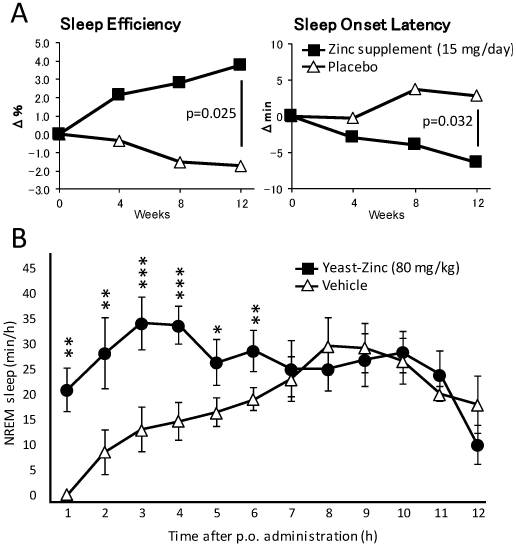Disclosure: This article may contain affiliate links. If you decide to make a purchase, I may make a small commission at no extra cost to you.
Getting poor sleep every night can just about wear anyone down and can have significant impacts on your health too. Healthy sleep habits are just as important as the foods you eat. Some diets can be very low in key micronutrients which affect sleep quality, such as magnesium and zinc.

Over the years I’ve run into problems with both of these minerals. Over a year ago I realized I was showing symptoms of zinc deficiency, probably caused by the amount of copper in my diet and the types of foods I was eating, which inhibited its absorption.
And back in late 2005, I had experienced symptoms associated with magnesium deficiency that was pretty scary. It was only after 1 year and through my own research that I discovered what was causing my health problems. Then once I started to supplement magnesium, all the symptoms I had been experiencing just went away within a short period of time and have never come back.
So that’s the short version of my story and my issues with magnesium and zinc.
I know of many people, especially vegetarians and vegans who’ve experienced similar issues. We know that we have to supplement things like B12, but we can become too complacent about other nutrients in our diet.
The importance of magnesium and zinc for good sleep quality
Through looking around on PubMed and forums, I’ve come across some interesting studies indicating that sleep quality is affected by both magnesium and zinc.
And it’s not surprising either that both of these minerals can impact sleep quality, but a lot more attention is given to magnesium for its ability to help you relax, as well as reduce anxiety and stress.
Zinc is an important coenzyme that is required for neuronal migration, and synaptogenesis in the brain. It’s also an important agonist or potentiator of the inhibitory neurotransmitter receptor gamma-aminobutyric acid (GABAA) while being antagonistic to the excitatory N-methyl-D-aspartate receptor (NMDA).
Likewise, magnesium has similar effects in reducing the excitability of the NMDA receptor and modulating glutamate activity and increasing GABAerigic availability.
Basically, we need to ensure that we get adequate amounts of these through diet or supplementation in order for our brain to function properly and to avoid some of the associated symptoms associated with a deficiency.
Below are a few studies which have been conducted in people who are young and old, and those who suffer from insomnia and other sleep disorders.
Study one
In a study published in the Journal of American Geriatrics Society, researchers looked at 43 patients who had persistent primary insomnia and then split them up into two groups.
Group A (22 patients) received a food supplement containing 5 mg of melatonin, 225 mg magnesium, and 11.25 mg of zinc, which was mixed with pear pulp.
Group B (21 patients) received the placebo which was just the pear pulp by itself.
Every day for 8 weeks, at least 1 hour before bedtime, patients were given this supplement and then researchers looked to measure the quality of sleep to see if it had improved. Sleep improvements were monitored using a wearable armband with a sensor.
The group receiving the supplements experienced improvements in different areas. They reported that it was easier to fall asleep, and their quality of sleep was better. They also noticed improvements in feeling more alert upon waking.
Patients also felt that they had a more restful and restorative sleep compared to the placebo group.
The study concluded that the combination of zinc, magnesium, and melatonin may improve sleep quality. Using the Pittsburgh sleep quality index, their score went from 12.7 ± 2.6 to 5.5 ± 1.9. [1].
The addition of melatonin in the study may be more useful for older patients than younger patients who are able to produce enough melatonin.
Study two
Eating a plant-based, vegan diet, can significantly increase copper intake relative to zinc, which may cause an imbalance and result is a secondary zinc deficiency.
In a study published in 2012, researchers looked at zinc to copper ratio on the quality of sleep in 126 adult women.
They noted that increase Zn/Cu ratio was associated with longer sleep duration compared to the lowest tertile.
With an increasing level of copper in their hair, they observed women slept much less. The most optimal sleep duration was in those with the highest tertile for zinc to copper ratio. [2]
Study three

A recent study involving 120 healthy individuals were enrolled in a trial looking at the effect of zinc-rich oysters and zinc-containing yeast extracts on their sleep.
The study lasted 12 weeks, where 2 groups of 30 volunteers were given 40 g of Pacific oysters with 15 mg of zinc and the placebo group received 40 g of scallops.
Compared with the placebo group, by the end of the 12 weeks, the individuals who consumed the zinc-rich food required less time to fall asleep and also improved sleep efficiency compared with the control group.
In the graph (B), mice that were given zinc-containing yeast extract (80mg/kg) had an increased amount of NREM sleep. [3]
Study four
Magnesium is known for having significant effects in helping promote relaxation and regulation of sleep.
In a double-blind, placebo-controlled study, 46 elderly subjects were randomly assigned to two groups: one group took 500 mg of magnesium and the other group took a placebo for 8 weeks.
At the start of the study, there was no difference between the quality of sleep among both groups, however, magnesium was able to improve sleep time, sleep efficiency, sleep onset latency. [4]
How common and zinc are magnesium deficiencies?
What reduces zinc and magnesium levels?
During various times, depletion of these minerals can occur faster than normal. It’s also common for most people to have difficulty absorbing certain minerals due to differences in genetics, metabolism, and diets.
Here are a few things which can impair absorption and cause deficiencies in either of these minerals:
- Some types of antibiotics
- Diuretics (often used for heart disease)
- Corticosteroids
- High levels of estrogen
- Chronic infections
- Chronic anxiety and depression
- Chronic illness
- Alcoholism
These are just a few of the things which can reduce levels of zinc and magnesium in the body and affect your overall health, including sleep.
Conclusion
Getting enough magnesium and zinc appears to be crucial for maintaining a healthy and restful sleeping pattern. Some people may be at more risk of developing a deficiency than others, even if it appears they are getting enough from diet alone.
I’ve come across quite a few people who are on a vegan diet and have experienced issues with magnesium and zinc deficiency, so it’s something to stay mindful of.
Given these findings from several studies, supplementing zinc and magnesium before you go to bed might be a great idea to help you have a more restful sleep so you’re ready to take on the next day!
Interesting talk about sleep. Enjoy! 🙂
Article reviewed and updated: February 2019









